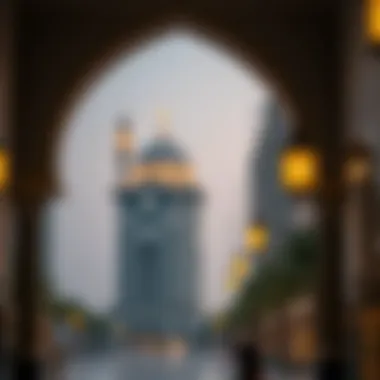Understanding Ramadan Timing in Dubai: A Detailed Guide


Intro
Navigating the multifaceted dynamics of Dubai during Ramadan can be a nuanced endeavor, particularly for property investors, residents, and expatriates. During this sacred month, a myriad of traditions and practices shape daily life, influencing everything from meal times to business hours. Beyond the spiritual significance, understanding how Ramadan timings affect housing and investment in Dubai is essential for those tucked into the real estate market.
Many may not realize the profound impact that the rhythmic ebb and flow of Ramadan has on the city’s pulse. From the nightly Iftar meals that mark the breaking of the fast, to the late-night gatherings that lead into Suhoor, or the pre-dawn meal, every aspect weaves into daily life. A firm grasp of these cultural rhythms is crucial to making informed decisions, especially for those eyeing investments or shifts in lifestyle.
This section lays the groundwork for understanding how Ramadan timings in Dubai play a role in urban routines, societal interactions, and ultimately, the real estate landscape. As Dubai stands as a beacon of modernity nestled within deep-rooted traditions, appreciating this blend not only honors the cultural context but also sharpens our insight into market trends and opportunities.
The Significance of Ramadan in Dubai
Ramadan holds profound significance in Dubai, weaving together threads of spirituality, culture, and social observance. As a month of fasting, reflection, and devotion, it transcends mere religious activities and permeates various aspects of life in this vibrant city. The multifaceted nature of Ramadan in Dubai makes it a critical focus of both community life and economic activities. Investors, real estate agents, and residents should grasp the nuances of this period, as it can impact their plans, interactions, and understanding of local customs.
Historical Context
Understanding the historical context of Ramadan in Dubai provides deeper insights into its observed practices and societal impacts. Historically, Ramadan has been celebrated for centuries across Muslim communities globally. In Dubai, the advent of Islam was punctuated by the embrace of Ramadan as a time for spiritual growth. The evolution of traditions, rituals, and societal roles observed during this period can give a clearer picture of how Ramadan has not only preserved religious tenets but has also influenced cultural identity.
In many ways, the traditions that take shape during Ramadan are reflective of Dubai’s journey from a small fishing village to a bustling metropolis. Various generations have contributed to the unique character of Ramadan traditions—from the communal Iftar gatherings to local charity initiatives aimed at helping those in need. This historical foundation solidifies Ramadan's importance in understanding the communal values that bind citizens and expatriates alike.
Cultural Importance
The cultural importance of Ramadan in Dubai cannot be overstated. It serves as a unifying force, bridging the gap between different cultures and promoting mutual respect. During this holy month, the essence of generosity and kindness shines brightly, with families hurriedly preparing meals for Iftar—the evening meal when the fast is broken. These meals often become elaborate affairs, encouraging shared experiences.
In the hustle and bustle of Dubai, Ramadan prompts a shift in routines. Work hours often adjust to accommodate fasting schedules, signaling a change in both professional and social dynamics.
“During Ramadan, the city shifts its beat, with nights transforming into vibrant gatherings.”
For expatriates and newcomers, understanding these cultural nuances is essential. Observances like community prayers at mosques, the sounds of the adhan (call to prayer), and the striking visual elements of Ramadan decorations create an ambiance that is both unique and inviting.
Moreover, local businesses tailor their offerings, creating Ramadan-specific deals, events, and promotions, shaping consumer behavior during this month. This cultural infusion not only satisfies the needs of those observing Ramadan but also educates and involves others in its practices.
In summary, embracing the significance of Ramadan in Dubai not only enriches individual experiences but also aids in fostering a sense of belonging within this multicultural society. Understanding its historical and cultural contexts enables residents and investors alike to navigate the dynamics during this month more effectively.
Ramadan Timings Explained
Navigating the timing of Ramadan is essential for both residents and visitors in Dubai. These timings dictate the daily routines, shaping everything from work schedules to meal times. Understanding these timings allows individuals to harmonize their activities with the spiritual essence of Ramadan, ensuring they respect the customs while also managing their own daily commitments. The significance of these timings stretches far beyond the clock; it's about adapting to the rhythm of a month dedicated to reflection, community, and personal growth.
Understanding Fajr and Maghrib
At the core of Ramadan timings are the prayer times, specifically Fajr and Maghrib. Fajr, the pre-dawn prayer, marks the beginning of the daily fast. As the sun rises, Muslims partake in the meal known as Suhoor to prepare for the day's fast. It’s a time of spiritual contemplation, and a simple act of eating can set the tone for devotion and gratitude.
Maghrib, on the other hand, is the evening prayer that coincides with sunset, signaling the end of the fasting period for the day. Traditionally, families gather to break their fast with dates and water, followed by a larger iftar meal featuring various dishes from local cuisine. The moment of Maghrib is often filled with excitement; it brings people together, renewing social ties and building a sense of community.
"The breaking of the fast is a special moment, a source of joy shared with family and friends. It's as much about food as it is about fellowship."
Understanding the exact timings for these prayers is crucial. The timings vary throughout the month and are influenced by the position of the sun. Thus, keeping track of local prayer schedules becomes essential for planning daily activities.
Daily Schedule Overview
The daily schedule during Ramadan in Dubai takes on a unique rhythm, balancing the observance of the fast with continued professional and personal lives. Here's a brief overview of how a typical day might unfold:
- Pre-Dawn Hours:
- Daytime:
- Evening:
- Wake up early for Suhoor. This is when people indulge in nutritious meals to sustain them through the day.
- Individuals often pray Fajr to kickstart the day spiritually.


- Work hours may shift. Companies tend to adopt shorter working hours to accommodate fasting schedules.
- Schools also adjust timings, allowing children to start later in the day.
- As Maghrib approaches, there is a palpable sense of anticipation. People start gathering around dinner tables, and restaurants often see a surge in reservations for iftar.
- After breaking fast, some may attend evening prayers at mosques or community centers.
This flexible schedule respects the primary obligations of Ramadan while also allowing everyday life to proceed more smoothly. For investors and real estate professionals, grasping these changes in social behavior can significantly influence marketing strategies and client interactions.
Ramadan's Influence on Daily Life
Ramadan casts a significant shadow over the ordinary ebb and flow of daily life in Dubai. This sacred month does more than just alter the clock; it reshapes how families interact, businesses operate, and even the city pulse beat.
Work and School Schedules
During Ramadan, the workweek takes on a slightly relaxed vibe. Many organizations, in a bid to accommodate their employees, implement modified working hours. Typically, the working day is reduced, often starting later and ending earlier to allow for rest and preparation for the evening fast-breaking meal, Iftar.
For instance, an employee may find that their hours change from the standard 9 AM - 5 PM to something like 10 AM - 4 PM. Schools also adopt similar approaches. Afternoon sessions might be reduced, and homework expectations loosened to help students cope with the fatigue that accompanies fasting.
- Employers’ Responses:
Many employers advocate for flexibility, understanding that productivity may fluctuate. - School Adjustments:
Schools often hold Iftar events to foster community spirit, bridging gaps between students and their families.
"In Ramadan, the routines shift, reflecting a collective commitment to both faith and culture."
Shopping and Dining Preferences
As the sun sets and the fast breaks, Ramadan transforms the shopping and dining experiences throughout Dubai. Malls become bustling hubs as families and friends gather to enjoy Iftar dinners. Notably, many restaurants offer special Ramadan menus, often featuring traditional dishes that evoke the spirit of the season. The Market at Souk Al Bahar, for example, showcases multi-course Iftar buffets that are not just meals but community experiences.
Shopping patterns also evolve. Shoppers delay their outings until the evening. Many businesses, particularly retail, extend their hours late into the night, taking advantage of this unique shopping surge post-Iftar.
- Unique Offers:
Various retailers introduce Ramadan-themed promotions, enticing customers looking for festive deals. - Evening Crowds:
Shopping centers see an uptick in foot traffic as families gather to shop and dine together.
Even though the daytime feels slower and quieter due to fasting, the vibrancy of life returns after sunset. Thus, Ramadan interweaves community values and economic activity, creating a blend of spirituality and social engagement that thrives well into the night.
Real Estate Dynamics During Ramadan
Ramadan is not just a month of fasting and reflection, but it also brings a ripple effect through various sectors, including real estate. For those involved in buying, selling, or renting properties in Dubai, understanding these dynamics is essential. As the holy month approaches, trends can shift significantly, impacting market behavior, buyer priorities, and ultimately, investment decisions. This section dives deep into how Ramadan influences real estate activities and provides crucial insights for investors and stakeholders.
Market Activity Trends
As the sun sets during Ramadan, Dubai’s property market becomes particularly vibrant. Marketing strategies frequently shift, emphasizing family-oriented and community-focused events that buoy the atmosphere.
- Increased Activity: Many investors and homebuyers tend to accelerate their property search during the weeks leading up to Ramadan, seeking to finalize deals so families can settle in before the month starts. Real estate agents often find themselves busier, with potential buyers eager to learn about various listings and available financing options.
- Promotions and Incentives: Developers and real estate companies often roll out attractive offers during Ramadan. Discounts, waiving of processing fees, and flexible payment plans become common as agents try to draw in clients during the season's spiritual atmosphere.
- Seasoned Investors: Investors well-acquainted with the market recognize that Ramadan can also serve as a time to reassess portfolios. They may look for undervalued properties or opportunities that align with their long-term strategies while paying heed to how the cultural sensibilities can affect property appeal.
The market sees a unique balance where urgency meets caution. For instance, while many are eager to finalize transactions, the importance of timing, particularly around prayer times, influences meeting schedules and open house events. Consequently, agents that adapt their strategies during this period are likely to experience more success.
Impact on Property Investments
The holy month not only ushers in spiritual growth but can also propel significant changes in property investment.
- Securing Long-term Rentals: Many families tend to secure rentals for the duration of the month due to gatherings and family visits, which can often mean increased demand for larger living spaces. Investors who can provide attractive furlough properties see their investment returns grow during this period.
- Hospitality Sector Realignment: Properties in the hospitality sector also react to the demand patterns seen through Ramadan. Hotels and serviced apartments often present special iftar packages to both locals and travelers, enhancing revenue potential.
- Market Resilience: While Ramadan can slow down purchases, it doesn't hinder investment outlooks. Smart investors closely observe trends. For instance, any property developments that align with communal gatherings or cultural events often see sustained interest even beyond Ramadan.
Additionally, it’s critical to approach property investment during Ramadan with a nuanced understanding of the market's cycle. Awareness of how local customs and behaviors influence buying choices can provide a competitive edge to astute investors.
"Understanding Ramadan’s multi-faceted impact on real estate can distinguish informed investors from the rest during this unique period in Dubai."
Real estate dynamics during Ramadan are indeed influenced by a mix of cultural admiration and economic prudence. By grasping the trends and engaging with community values, stakeholders can navigate this period effectively, turning challenges into profitable ventures.


Navigating Property Purchases During Ramadan
Purchasing property during Ramadan requires a nuanced understanding of how the holy month affects the real estate sector in Dubai. Given the cultural and religious significance of Ramadan, investors and homebuyers must adapt their strategies to align with the unique landscape that this period creates. The benefits of understanding and adapting to these changes can significantly enhance the purchasing experience and improve outcomes.
Potential buyers must be aware that the typical pace of real estate transactions may slow during Ramadan. Not only do working hours shorten, but many individuals also engage in fasting and religious practices that can affect their availability. Therefore, the ability to navigate property purchases with patience and flexibility is essential.
Additionally, there are some practical advantages to consider when approaching property transactions in this month. Sellers may be more motivated to close deals before Eid al-Fitr, the festive conclusion of Ramadan, making it a potentially opportune time for negotiation.
Adapting to Timings in Transactions
Understanding the adjusted timings for property-related transactions during Ramadan is paramount. Fajr, the pre-dawn prayer, often marks the start of the day, while Maghrib, the prayer that occurs just after sunset, signals the end of it. Irrespective of the business sector, many activities are concentrated around these times, with common hours for viewing and negotiating reduced.
As such, it’s advisable for buyers to schedule property viewings and meetings with agents during the late morning to early afternoon, taking into consideration that many offices observe shortened hours closer to Iftar, the evening meal that breaks the fast.
Key Points When Adapting to Ramadan Timings:
- Shortened Working Hours: Expect offices to close early.
- Limitations on Viewings: Schedule showings well before Iftar.
- Flexible Negotiation: Parties may be more open to negotiation earlier in the month.
Communicating with Agents
Effective communication with real estate agents can significantly streamline the property purchasing process during Ramadan. Given the cultural context, it helps to acknowledge the importance of the month and express understanding regarding the changes in schedules.
When reaching out to agents, it’s essential to convey flexibility in your request and to arrange meetings around the prayer times. Recognizing that many agents may be observing their own fasting rituals can also foster a more cooperative relationship.
Tips for Effective Communication:
- Be Respectful of Their Time: Propose meeting times that accommodate their Ramadan schedule.
- Be Patient: Understand that response times may vary.
- Use Clear and Concise Language: Avoid lengthy explanations, focusing on key points.
"In the spirit of Ramadan, fostering clear communication builds rapport, ensuring mutual understanding – a crucial element when making significant financial decisions."
By approaching property purchases with a deep understanding of Ramadan's impact, investors can significantly enhance their experience and outcomes. Adaptation to timings and effective communication with agents are foundational practices, setting the stage for successful transactions in the bustling market of Dubai during this sacred month.
Community Activities and Events
The month of Ramadan brings an air of togetherness in Dubai, and community activities and events play a pivotal role in fostering this spirit. Residents and visitors alike find themselves immersed in a tapestry of shared experiences. Whether it’s the plethora of events organized at various community centers or simple acts of kindness like local iftar gatherings, these activities resonate with the core values of compassion and unity.
Family and Social Gatherings
During Ramadan, family becomes the cornerstone of social life. Families gather not just for iftar, the meal to break fast, but also for evening prayers and shared moments of reflection. The essence lies in strengthening bonds among family members, often leading to the revival of traditions passed down through generations. In Dubai, one can observe families journeying to local mosques, participating in prayers together, and fostering a sense of belonging.
Additionally, community activities often include events organized around cultural practices. For instance, gatherings to engage in Qur’an recitation competitions or sharing stories of Ramadan experiences can enhance family ties while creating a sense of community. These events often happen at local parks and community centers, where families meet to celebrate and mark the month together.
Key Benefits of Family Gatherings:
- Strengthening familial bonds
- Sharing stories and experiences
- Creating a stronger sense of community
- Preserving cultural traditions
Community Iftars and Outreach
Community iftars, where groups come together to break the fast, are crucial in Dubai during Ramadan. These gatherings are not solely about food; they are about unity and outreach. Local organizations, mosques, and even private entities often host these events, inviting people from various backgrounds to partake. This is a particularly important aspect, as it promotes intercultural dialogue and understanding, showcasing the harmonious coexistence of different cultures.
Moreover, many community iftars extend invitations to the less fortunate, allowing them to experience the joy of breaking fast alongside others. It's quite typical for Dubai’s community leaders and businesses to sponsor meals for those in need, thereby embedding charity deeply into Ramadan’s ethos.
Outreach Programs:


- Collaboration with local NGOs to feed the homeless
- Initiatives to provide food and essentials to low-income families
- Volunteering opportunities for residents to give back to the community
The sense of camaraderie and shared purpose during these events underscores the unified approach of Dubai's diverse residents in reflecting the true essence of Ramadan.
"Ramadan is not just about abstaining from food; it's a reminder of the importance of compassion, empathy, and unity within the community."
In essence, community activities and events during Ramadan in Dubai go beyond mere gatherings. They ensure that the fundamental values of the month are kept alive and embraced collectively, echoing through generations.
Health Considerations During Ramadan
The observance of Ramadan in Dubai comes with a unique set of challenges and opportunities, particularly concerning health and well-being. As the city pulses with life during this holy month, it’s crucial for both residents and visitors to understand how to adjust their lifestyles effectively. With fasting from dawn until sunset, the timing of meals and fluid intake takes on particular significance.
Good health is paramount for anyone observing Ramadan, as sustaining energy and vitality is key to fully engaging in the month’s spiritual and communal activities. As such, making informed choices regarding diet and hydration becomes essential.
Adjusting Eating Habits
Ramadan isn’t just a time for fasting; it provides a chance for renewal in eating habits. After a day of fasting, the meals during Iftar (the meal to break the fast) and Suhoor (the pre-dawn meal) can influence one’s health significantly.
- Incorporating Nutrient-Dense Foods:
- Portion Control:
- Balancing Meals:
- It's wise to prioritize food rich in vitamins and minerals. Including whole grains, fruits, vegetables, and lean proteins can help maintain energy levels. Avoiding excessive sugary or fried foods can prevent energy crashes throughout the fasting hours.
- Breaking fast doesn’t mean overindulging. It’s easy to get carried away at Iftar, but gradually introducing food can aid digestion and prevent discomfort. Starting with dates and water is a common practice, which aligns with tradition and offers quick energy.
- Ensuring a balanced approach at both Iftar and Suhoor helps keep your body nourished and balanced. A mix of carbohydrates, proteins, and fats can create a sustainable energy release. For instance, pairing chickpeas or lentils with rice or bread can provide a hearty meal.
As you transition through Ramadan, consider adjusting your meal styles slowly, avoiding heavy, rich food immediately after fasting to help your body adapt more gracefully.
Staying Hydrated
Hydration is vital during Ramadan, particularly in a city like Dubai, where temperatures can soar. Dehydration can lead to fatigue, headaches, blurring mental clarity, and negatively affect physical performance. Keeping hydrated requires a thoughtful approach to fluid intake, especially when you’re limited to the hours between sunset and dawn.
- Drink Water Wisely:
- Avoid Sugary Drinks:
- Incorporate Water-Rich Foods:
- It’s not just about quenching thirst. Aim to consume around 8-10 glasses of water between Iftar and Suhoor. Spreading this out over the hours helps replenish lost fluids throughout the day.
- While it’s tempting to enjoy sweet juices or soft drinks at Iftar, these can lead to a rapid rise and fall in energy levels. Instead, turn to coconut water or herbal teas, which can offer hydration without the sugar rollercoaster.
- Foods such as cucumbers, watermelon, and soups not only provide hydration but also nutrients. Adding these to your Suhoor meal can enhance your water intake without the feeling of being water-logged.
Maintaining a focus on health during Ramadan can significantly enhance the experience of this blessed month. The symbiotic relationship between nutrition and hydration can lead to a fruitful Ramadan, where both spiritual richness and physical well-being coexist.
"Ramadan is a time for spiritual reflection, self-discipline, and community bonding; ensuring health during this month lays the foundation for a productive experience."
The End
In summing up the intricate dance of Ramadan timings in Dubai, it becomes evident that this period is more than just a calendar event; it's a deep-rooted cultural phenomenon. For residents and expatriates alike, understanding the nuances of this holy month is critical. The changes in daily schedules, from work hours to meal times, ripple through the fabric of life in this vibrant city, creating both challenges and opportunities.
Cultural Reflection
Ramadan in Dubai is not merely a time of fasting; it’s also a season marked by camaraderie and reflection. Families gather often, and communal meals at iftar foster a spirit of togetherness that transcends the individual experience of fasting. This is a time where the essence of community flourishes through shared meals and traditions. The Emirati culture, with its emphasis on hospitality, becomes particularly visible as residents open their homes to friends, families, and even strangers.
Moreover, the month prompts a reevaluation of one’s personal beliefs and practices. People engage in spiritual reflection, often participating in community outreach programs and charitable events. Schools and educational institutions also take this opportunity to instill the values of generosity and empathy. In the broader context, this period serves as a reminder of the importance of unity and understanding across diverse cultures, especially in a melting pot like Dubai.
Looking Ahead
As Dubai continues to evolve, so too does the nature of Ramadan. Future observations of Ramadan might see shifts in daily practices shaped by factors like technological advancements and changing demographics. With an increasing number of expats, the way Ramadan is observed may blend traditional practices with modern influences, leading to unique expressions of this holy month.
Furthermore, from a practical standpoint, investors and businesses must remain adaptable. Understanding the dynamics of Ramadan can yield significant insights into market trends, especially in the real estate sector. As communal awareness grows and the population diversifies, the strategies surrounding property investments during this time will likely evolve.
As we move forward, staying attuned to these shifts can help all stakeholders in the community – whether they be homeowners, investors or developers – better navigate the landscape. It’s a balancing act of honoring tradition while embracing innovation, all under the welcoming skies of Dubai during this remarkable month.











